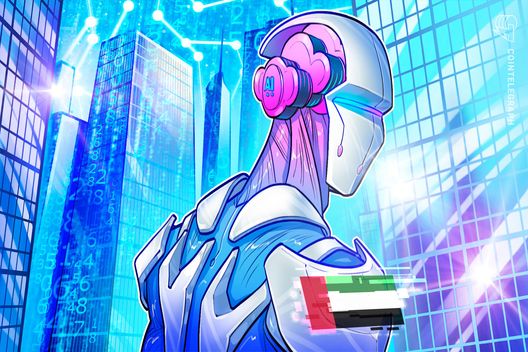

The United Arab Emirates (UAE) is making a significant bet on the future of its economy by embracing tokenized machines, partnering with layer-1 blockchain peaq to launch the world's first Machine Economy Free Zone (MEFZ). This initiative, spearheaded in collaboration with Pulsar Group, an Emirati venture studio, aims to establish a sandbox environment in Abu Dhabi and Dubai where humans and machines can co-exist and co-create value in an age of abundance. The MEFZ focuses on regulation, investment, deployment, and driving relevant innovation in the region.
The MEFZ envisions a human-centric machine economy. This means that autonomous robots, machines, and devices will create value, earn, and trade, with humans playing a central role in shaping and benefiting from this new economic paradigm. This vision is critical as the world grapples with increasing automation and the potential displacement of human workers. The UAE's approach seeks to ensure that technological advancements benefit society as a whole.
The initiative rests on four core pillars. The first is regulation. Peaq is actively developing and testing regulatory initiatives and sandboxes within the MEFZ, focusing on compliant tokenization and investment in autonomous machines and robots. This includes establishing frameworks for Machine Tokenization, which aims to lower the barrier to entry for individuals to invest in expensive robots and machines. By creating clear and supportive regulations, the UAE aims to attract innovators and investors to the machine economy space.
The second pillar is deployment. Peaq is working with Emirati partners to establish physical and virtual sandboxes where founders can experiment with new business models and deploy applications, devices, and technologies that will power more advanced smart cities. This includes setting up innovation hubs focused on supporting Decentralized Physical Infrastructure (DePIN) applications in research and development. These sandboxes provide a controlled environment for testing and refining new technologies before they are deployed on a larger scale.
The third pillar is investment. Peaq is connecting top-performing DePINs on its network with visionary investment bodies and institutional partners in the region, enabling them to scale and deploy at lightning speed. This involves establishing a regional innovation hub focused on supporting DePIN apps, facilitating their connection with "demand side" organizations. The initiative will fast-track the deployment of emerging technologies and nurture a new wave of innovation through community-led DePIN applications.
The fourth pillar is innovation. A regional innovation hub will support DePIN-focused research, development, and deployment, while also facilitating collaboration with real-world demand partners. This ensures the Machine Economy Free Zone will support the development of decentralized physical infrastructure and community-owned machine-based applications.
One of the key innovations to be tested in the MEFZ is a framework for Machine Tokenization. This framework is designed to democratize investment in robots and intelligent devices, enabling individuals to co-own high-cost machines. This is a crucial element of Peaq's "Machine DeFi" vision, which aims to create a decentralized financial system for robots, vehicles, and machines.
The MEFZ will also include the world's first pilot of "Universal Basic Ownership (UBO)." This innovative concept aims to create an income stream directly tied to machine-generated profits, without intermediaries. The goal of the UBO pilot is to test how abundance generated by robots can be directly distributed to individuals and communities affected by job automation. This could provide a safety net for workers displaced by automation and ensure that the benefits of the machine economy are shared more equitably.
The UAE's commitment to this initiative is further underscored by Peaq's decision to establish its new headquarters in the Emirates, signaling its long-term commitment to the region and its vision of making the UAE the heart of the machine economy. This move follows the successful Machine Economy Days held in Abu Dhabi and Dubai, which drew high-level participation from both the public and private sectors.
The UAE has already become a key hub for tokenization, with Dubai's Virtual Asset Regulatory Authority (VARA) updating its framework for bringing real-world assets (RWAs) on-chain. Blockchain-based real estate transactions have reached billions of dollars in Dubai, and the Dubai Land Department, the Dubai Future Foundation, and the Central Bank of the United Arab Emirates have launched the region's first licensed tokenized real estate project.
DePINs are gaining mainstream attention, and the market could reach $3.5 trillion by 2028, driven by advances in blockchain technology and artificial intelligence, according to the World Economic Forum. The UAE's focus on DePINs and machine tokenization positions it as a leader in this rapidly growing space.
The UAE is strategically positioning itself as a global hub for the digital economy, leveraging blockchain technology to enhance economic security, improve efficiency, and foster innovation. The Machine Economy Free Zone is a bold step towards realizing this vision, creating a future where humans and machines work together to create a more prosperous and equitable world.